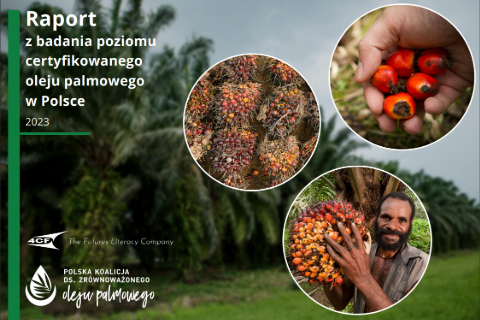Polish Sustainable Palm Oil Coalition (PKZOP)
Study of Certified Palm Oil Levels in Poland (2021-2022)


Task
The Polish Sustainable Palm Oil Coalition (PKZOP) planned to continue its research on the palm oil market in Poland, initially conducted during 2019-2020. The objective of the study was to determine the total consumption of palm oil in Poland and to estimate the share of RSPO (Roundtable on Sustainable Palm Oil) certified oil within the Polish market. The findings were intended to evaluate the progress of the organisation’s sustainability strategy. Consequently, the Polish Sustainable Palm Oil Coalition commissioned 4CF to undertake the research and produce a comprehensive report.

Solution
As part of the collaboration, 4CF conducted an analysis of data obtained from the Central Statistical Office and RSPO (Roundtable on Sustainable Palm Oil) certification. Additionally, a Delphi study was carried out with members of the Sustainable Palm Oil Coalition to assess the potential shifts in current palm oil consumption trends in Poland. The study focused on addressing two key questions: to what extent Coalition members are achieving the strategic goals of the PKZOP, and to estimate changes in the level of certified palm oil in the market by 2030. The study was conducted using an online Delphi research tool—the 4CF HalnyX smart-Delphi platform. Based on the analysis and survey results, 4CF produced a report that included the total palm oil consumption in Poland and an estimate of the share of RSPO-certified palm oil in the Polish market.

Effect
A study conducted by 4CF for the Polish Sustainable Palm Oil Coalition provides valuable information on the palm oil market in Poland and its future.
As of 2019, the importation of crude palm oil into Poland has remained relatively stable, experiencing a modest annual decline of 1%. A similar trend can be observed in palm oil imports contained within products, which fluctuate marginally around the 1% mark. In 2021, Poland imported approximately 249,000 tonnes of crude palm oil and an additional 214,000 tonnes in its latent form. After accounting for the estimated volume of palm oil re-exported in latent form, it is estimated that around 407,000 tonnes were consumed within the Polish market in 2021, coinciding with a rise in per capita consumption.
In 2022, imports saw a slight decrease, with Poland receiving 247,000 tonnes of crude palm oil and 212,000 tonnes in latent form. The Netherlands and Germany continue to be the primary exporters of palm oil to Poland. However, in 2022, direct imports from the Netherlands gained increased significance, as a substantial portion of palm oil imported from Germany is originally sourced from the Netherlands. Despite the considerable rise in vegetable oil prices and export bans imposed by producer countries, the composition of Poland’s palm oil exports has altered, though they remain a minor fraction when compared to imports.
In 2021, the chemicals and cosmetics sector recorded the highest proportion of certified palm oil, with approximately 64% of its palm oil usage being certified. This segment represents roughly 20% of the total demand for palm oil in Poland. Within the food sector, the proportion of certified palm oil reached around 62%, with this sector accounting for approximately 60% of the overall demand for palm oil. In contrast, the level of certification for other uses stood at 29%, markedly lower than that observed in the other two categories. Across the entire market, the share of certified palm oil in Poland was estimated at 56% in 2021, at the Mass Balance and Segregated certification levels.
The use of palm oil is a subject that sparks considerable debate among decision-makers and remains contentious within the wider public. Owing to the efforts of esteemed environmental organisations such as WWF and IUCN, there is a growing awareness of the detrimental effects of excluding palm oil from production, alongside an increasing recognition of the need to source this raw material sustainably. RSPO certification is emerging as a recognised symbol of quality, ensuring adherence to both environmental and social standards. In Poland, initiatives led by organisations such as the Polish Sustainable Palm Oil Coalition have contributed to a rising share of certified palm oil, thereby fostering more sustainable practices within the sector.
Report: available here
